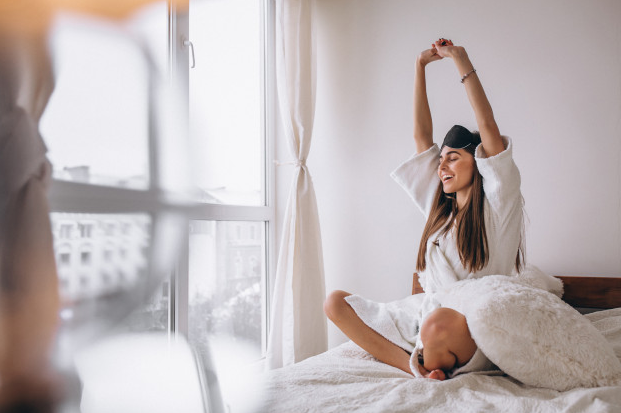It is no unknown fact that sleep is essential for a healthy physical and mental state. But despite the prevalence of this well-established thought, many people find themselves sleep-deprived and have notably bad sleeping habits.
Many find themselves awake and staring at the clock struck 3 a.m. Such sleeping cycles create inconveniences at work, school, and in other daily activities. Fortunately, improving your sleep-wake cycle is more under your control than you think. Although multiple reasons cause these sleeping problems, experts refer to a handful of ideas that fix your sleep-wake schedule. All organizations like the National Institutes of Health, the CDC, the American Academy of Family Physicians, and the National Institute on Aging refer to the same fundamental practices for better sleep routines.
As implementing all these tips and absorbing the science of sleep at once can be overwhelming, we have narrowed down the top 10 ideas for improving it. Following these habits can make your sleeping dreams a nightly reality!
How to Make Sleep Cycle Better?
With the following, you can now reset your biological clock for a better sleeping cycle.
Remember that fixing sleep schedules is not an all-or-nothing situation: start with small steps instead, and work your way towards a healthier sleeping pattern (sleep hygiene)!
1. Get Natural Light During Day
Exposure to safe levels of natural lighting in the day keeps your circadian rhythm healthy and in check. It improves nighttime sleep quality and duration with increased daytime energy.
Several studies are backing this up. One particular study showed improvement in the sleep schedules of insomniac people. There was a reduction of 83% in time to sleep after healthy and consistent daylight exposures. Therefore, try getting sunlight exposure daily. You may sit near windows or in naturally lit rooms.
2. Limit Your Caffeine, Alcohol, and Nicotine Intake
Caffeine, alcohol, and tobacco are all stimulants that may make one less sleepy. Although alcohol initially may make one drowsy, it acts as a stimulant after a while, increasing your number of awakenings and segmenting your sleep cycle.
Therefore, avoid foods and drinks with any of these contents. As a general rule of thumbs, refrain from all types of stimulants before bedtime. Bid farewell to your coffee, chocolate, cola, tea, and caffeine-containing foods for four to six hours before bedtime. For alcohol, have only one or two drinks a day and avoid smoking around sleeping time.
3. Say No to Bedtime Gadgets
Your electronic gadgets give off blue light, which interferes with your circadian rhythm. It reduces the production of sleep hormones like melatonin. Therefore, to sleep on time and fix your sleep-wake cycle, do not use gadgets at bedtime. We recommend putting them away at least an hour before sleeping. They also tend to distract one and may make you lose track of time.
4. Nap Early and Short or Don’t At All
While short power naps freshen up and increase productivity, make sure you take them early in the day. Sleeping too close to your bedtime can confuse your internal body clock, leading to sleep time struggles at night.
Your naps should also not belong or irregular as they can negatively impact your sleep. Multiple studies reveal how long and irregular naps do more harm than good, affecting your sleeping quality and health.
However, if you are used to regular long naps, it should not be much of a problem. Therefore, napping early and keeping them short is the key. Do not at all unless you have them regularly!
5. Stick to a Routine Strictly
To optimize your internal body clock, try to sleep and wake up at the same time. Even if you slept late, do not change the timings of you getting up. It is time to set your alarm clocks!
People sticking to a strict routine end up resetting their body clock and hence improving their sleep-wake cycles. Devise a schedule of your own as per your convenience. Make sure you get an ample amount of sleep in the long term for a healthy functioning body.
6. Optimize Your Bedroom Environment
Optimize your bedroom for a sleep-inducing environment. Make it quiet, dark, and cold for good sleep. Limit distractions within the room by blocking off sounds, keeping gadgets away, and limiting light exposure. If you live with someone else or especially have kids around, get yourself earplugs or white noise machines to block out disturbances. Place your gadgets outside. We also recommend using blackout shades and heavy curtains. They make your room pitch dark, sending a strong signal to your brain that it is time to sleep.
For a comfortable sleep environment, keep the temperature of your room cool and well-ventilated. We recommend setting between 60 and 75 F. Last but not least, buy yourself a comfortable mattress and pillow. You may even use essential oils like lavender to induce sleep. Find essential oils that help sleeplessness here.
7. Have Your Dinner Early
Eating habits affect circadian rhythm directly. Late dinners can delay sleep timings as your body focuses on digesting after intake for a while. Therefore, having dinner early — two to three hours before bedtime will prove beneficial. We also recommend avoiding high-fat, heavy meals. Go for a combination of carbs and proteins instead at dinner. Healthy eating habits improve sleep hygiene, positively impacting your sleep-wake cycles!
8. Set Bedtime Rituals
Setting bedtime rituals can fix your sleep-wake cycles by making them synchronized. Having a bedtime ritual routine can send powerful psychological cues to the body that it is time to sleep. Hence, follow a set of steps every night. It may include dimming lights, skincare routine, playing of white noise, brushing your teeth, or even reading a book. Over time, these actions will lend a hand in helping you sleep. Whenever you’d commit them, your body would know that it’s time to sleep.
9. Work Out Regularly
Working out is one effective way of resetting your sleep-wake cycles as it affects your internal body clock. It promotes a good sleep routine by aligning circadian rhythm and the production of sleep hormones like melatonin. It, however, does not mean that you have to do strenuous physical activities. Thirty minutes of moderate aerobic exercise is enough to get on track. We recommend doing it regularly for at least five days a week of your choice.
However, refrain from working out near bedtime as exercise increases your energy levels and overstimulates your body. Keep a cap time of at least 2 hours before sleeping.
10. Practice Relaxation
Your body releases hormones like cortisol when stressed or anxious. Cortisol makes one feel awake, affecting your sleep-wake cycles. Hence, it is imperative to destress yourself by practicing relaxation. You may do yoga (check our beginner’s guide to yoga), stretching, meditation, deep breathing, or anything that helps you relax.
Lastly, we recommend seeing a doctor rule out any sleeping disorder.
Why Do Sleep Schedules Get Off Track?
To implement our tips for improved sleep and make sure they work, you should also know how one gets off the track in the first place and why we have no one-time resetting magical button.
Our biological functions like sleep are controlled by an internal body clock known as a circadian rhythm. Circadian rhythm is a 24-hour cycle giving cues to your body about eating, sleeping, digesting, and other vital metabolic reactions.
Sleep schedules get off track because of a change in our genetically programmed internal memory. Given this, let’s look at the vital factors that may cause this:
- Jet Lag
- Odd Work Timings
- Advanced or Delayed Sleep Timing
- Increased Exposure to Artificial Light
- Irregular Sleep Routines
- Stress
- Physical and Mental Conditions
- Irregular Sleep Routines
Therefore, if you are watching a series or partying late at night, you might feel sleepy as your body at that point tells you it’s your time to sleep. However, if you ignore these messages for a good while, your internal body memory switches to a different sleeping cycle.
As it takes time to reset your circadian rhythm, fixing sleep has never been a one-time thing for the majority. It takes from days to weeks for people, depending on their lifestyle and time zones additionally.
The Takeaway
Fixing your sleep-wake cycle is imperative for a good and restful slumber. There are multiple ways, including our top 10 ideas above towards hygienic sleep. Remember to be slow and not be hard on yourself if it doesn’t seem to work out. Look out for symptoms of sleeping disorders and follow-up with a doctor in case you have developed one.



